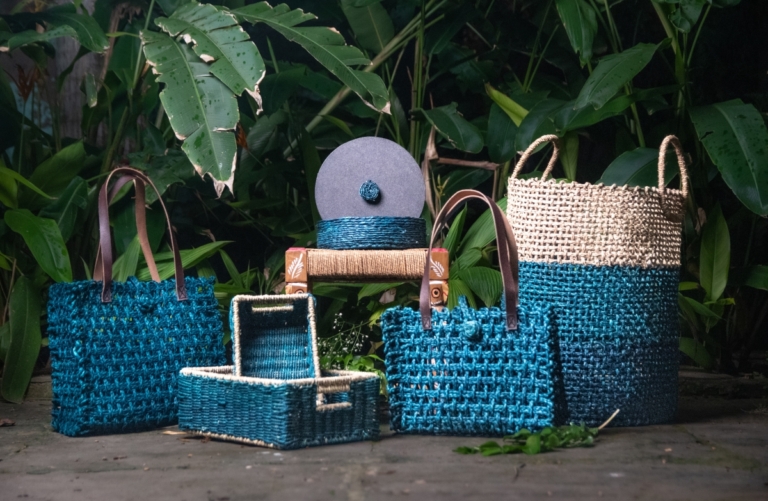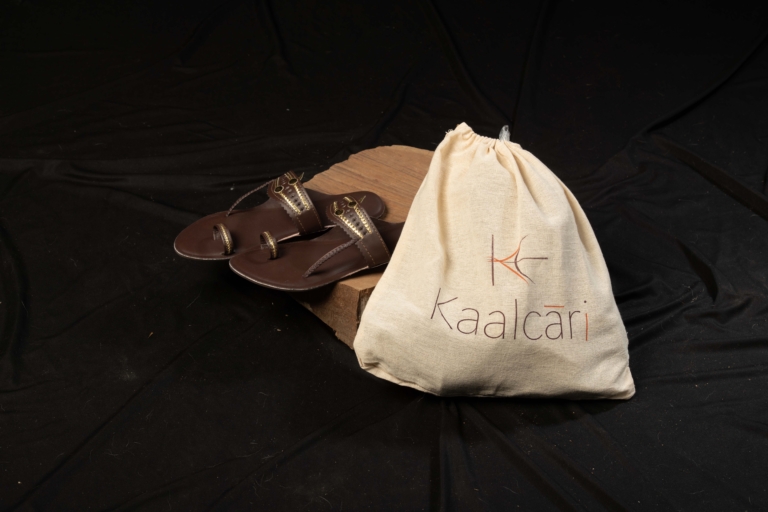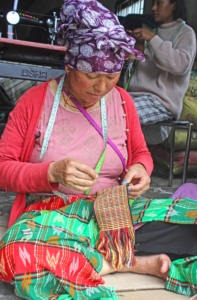
Its All Folk is a young cultural enterprise based in Arunachal Pradesh, founded by first-time entrepreneur Namrata Tiwari. The brand modernizes traditional Indian handloom practices, using yak wool to create their unique product line. This includes bags, pouches, hats, and more.
“I feel like we are more than a brand. We’re learning and pivoting really quickly. It seems to be evolving into something more like a social innovation and cultural lab.” Namrata states that their mission involves trying to identify and connect with underutilized communities as a tool to preserve and reinvent culturally and ecologically significant practices, to advance rural livelihood.
Follow our conversation with Namrata Tiwari, in which she discusses her journey building her enterprise, and the challenges she faced along the way.
Starting Its All Folk
Namrata Tiwari, the founder of Its All Folk, first started the business at 26 years old, when she first moved to the Northeastern part of India. She was initially working in the fashion industry when she came to realize that there is a huge economic disparity between the artisans who make the products and the designers, where the industry itself generates huge amounts of income, but the artisans are amongst the poorest people in the supply chain. Unable to ignore this, she subsequently left her job and decided to move to Meghalaya.
She began working as a designer, partnering with several NGOs in the region and initially intended for Its All Folk to be an archiving project (stemming from her desire to document the rich cultural tapestry of the region, the business started as a Tumblr blog). She felt strongly that there wasn’t enough representation from the Northeast in the general media, nor was there much knowledge about the crafts that originated from there.
Originally, the idea behind Its All Folk was to document the communities that Namrata was working with, including their crafts, culture, processes and values. Since then the brand has come a long way, starting as a research and archiving project, eventually becoming a private company in 2022, and now a social enterprise.
“Through my work I wanted to continue amplifying sustainability efforts in fashion and design that prioritized meeting the needs of the poor with a focus on resource stewardship and shared economies.”, Namrata says.
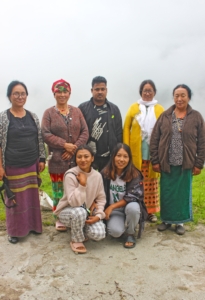
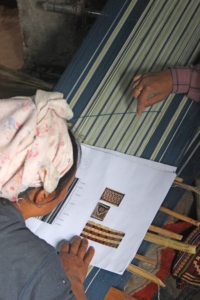
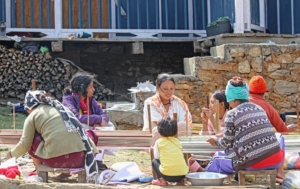
Working in depth with indigenous communities in the North-Eastern part of India (more specifically, in Arunachal Pradesh) has allowed her to understand the issues that these artisanal groups face. She therefore felt it was a natural transition for her, starting as just an entrepreneur and ending up with a cultural enterprise with a mission to bring change. They are currently piloting in Arunachal Pradesh, trying to make these generational art forms sustainable for the modern world.
Products they create
Referring to the products that they sell, Namrata says, “It’s All Folk is like a large umbrella under which we are trying to build different collectives. Since we come from Arunachal Pradesh, which doesn’t have a lot of institutions in place, we are still working on creating foundations for the work we are doing”. They currently manage two collectives – the Brokpa collective, which aims to incentivize the use of yak fiber, and the Dangnga collective, which aims to valorize and reinterpret the traditional loin loom weaves of Daangnga. Overall, both collectives aim to create income opportunities for weavers and yak herders of the Monpa community.
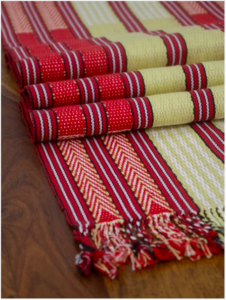
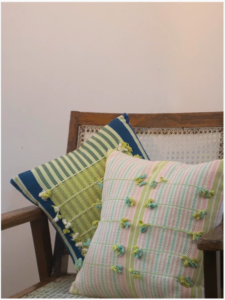
The Daangnga collective was launched in January of 2022. The company is currently training around 22 women weavers in product diversification, thereby effectively creating a new collection that is completely handmade and made entirely in Arunachal Pradesh. Their product line includes bags, pouches, laptop cases, hats, and more.
What makes their products unique
When asked about what she thinks makes Its All Folk products unique, Namrata stated that being one of the few enterprises working out of Arunachal Pradesh has allowed them to stand out from the rest. They are one of the first brands to create contemporary, modern products from the traditional loin loom weaving techniques of Arunachal Pradesh.
She also believes that the use of yak hair to make their products is another aspect of the company that makes them special. They are currently the only enterprise in the Eastern Himalayas that are exploring and experimenting with yak wool, and its potential uses. Additionally, during the production process, they try to harness the coarse yak hair, which is an agricultural byproduct.
“Lastly, we are trying to connect crafts with conservation. There is a lot of talk about how the artisan economy is sustainable, but we are trying to take it a step ahead by forging important partnerships. For example, we are working with the World Wildlife Fund in India. Through them, we are working with forest communities, and in village communities.”
Through Its All Folk, Namrata and her team are trying to incentivize conservation practices of traditional crafting techniques, not just in terms of using natural products, but also boosting the financial capabilities of indigenous groups sustainably.
Their typical customer
Its All Folk is still in its early stages (as it is only around 18 months old). Adding this to the fact that Arunachal Pradesh is a region with very little product diversification and commercial weaving, the company is currently still analyzing what type of customers it attracts. They are at the stage where they are launching, relaunching, and sometimes removing products from their collection, based on the customer reaction. From what has been gathered, Namrata has surmised that their most frequent customers are people who are socially, environmentally, and economically conscious. The company places a lot of importance on changing circumstances for indigenous communities, so their customer is also someone who is mindful of the purchases they make, and what kind of impact they create.
“Our products don’t really cater to changing trends. We want to create something classy and timeless, which aligns with the kind of customers we attract. We are targeting customers who are sensitive, conscious, and mindful of what they’re buying.”
Product Marketing
At this stage in the building of their brand, the company has been doing a lot of exhibitions and pop-up stores. Namrata feels that because their products are handmade from natural materials, the customers need to touch and feel the products when buying them, and they need to start conversations about the products and where they come from. The products are positioned in a few stores in Goa and Bangalore and in stores in the UK, including the e-commerce website Flourish. Namrata also feels that this pop-up store model works for them as they don’t have large quantities of products, and it also allows customers to interact with and understand the authenticity of the craft.
The fact that the work happening at Its All Folk naturally aligns with various global issues that are being faced right now allows for scaling opportunities for the business. Working with forest communities and groups that have declared their regions as conserved areas, has allowed the company to enhance and promote these values such as sustainable development, advancing biodiversity conservation, and climate action. In that sense, the enterprise sees many opportunities to further develop its business, as there is a huge demand for products that support sustainability.
The Its All Folk team
The Its All Folk team includes Namrata, who leads the creative and strategy development facets of the company, a consultant, who advises the company on managing finances, and interns from colleges like NID (National Institute of Design), who come to work on projects.
In the short time that the enterprise has been active, they have managed to foster some crucial partnerships and alliances that have allowed them to grow. These include their partnership with the World Wildlife Fund, the Darwin Initiative, and the Sasha association in Kolkata, whom they collaborate with for the final stitching of the products.
Challenges and learnings when starting an enterprise
“The biggest challenge for us has been starting from a region that has very poor [economic] infrastructure, and not many institutions in place. We’re working with nomadic communities, and we’re trying to revive something that’s on the brink of extinction. Putting systems in place and setting a foundation have been our biggest challenges.”
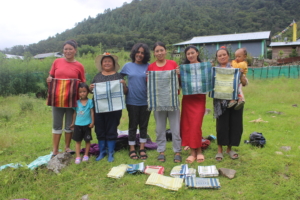
Balancing the aims of the company with the aspirations of the artisans has also been an obstacle. While the company mainly wants to conserve the artisan’s generational crafts and practices, Namrata has found that artisans also hope for better lives for themselves and their children.
When asked about how she is overcoming this problem, Namrata states, “After so many years of working with artisan or indigenous communities, I’ve found that the best way to empower them is by having open conversations with them. We try to show them that there is value in their traditional heritage, and in their ideas.”
“I think my biggest learning was to not take failures to heart. I think that change is such a constant thing, especially with entrepreneurship, you have to be so agile. It’s a lot of mental gymnastics, especially in the first five years, so much is not going to work.”
Namrata went on to state that initially, she used to get very disappointed with setbacks, but now she takes it in her stride and focuses her energy more on sorting problems out and finding solutions.
“It’s not just that we’re trying to make a pretty product. As an enterprise, we are working towards a change in the system. That’s why we have these very important collaborations with stakeholders. It’s because we understand the uniqueness of traditional craftsmanship.”
Namrata has been following NICEorg even before she founded Its All Folk. She’s very familiar with the organization’s work and finds that her association with the network improves her company’s credibility. She concludes by talking about how she is grateful to have access to this network.
All images are provided and belong to It’s All Folk
Author: Aamani

